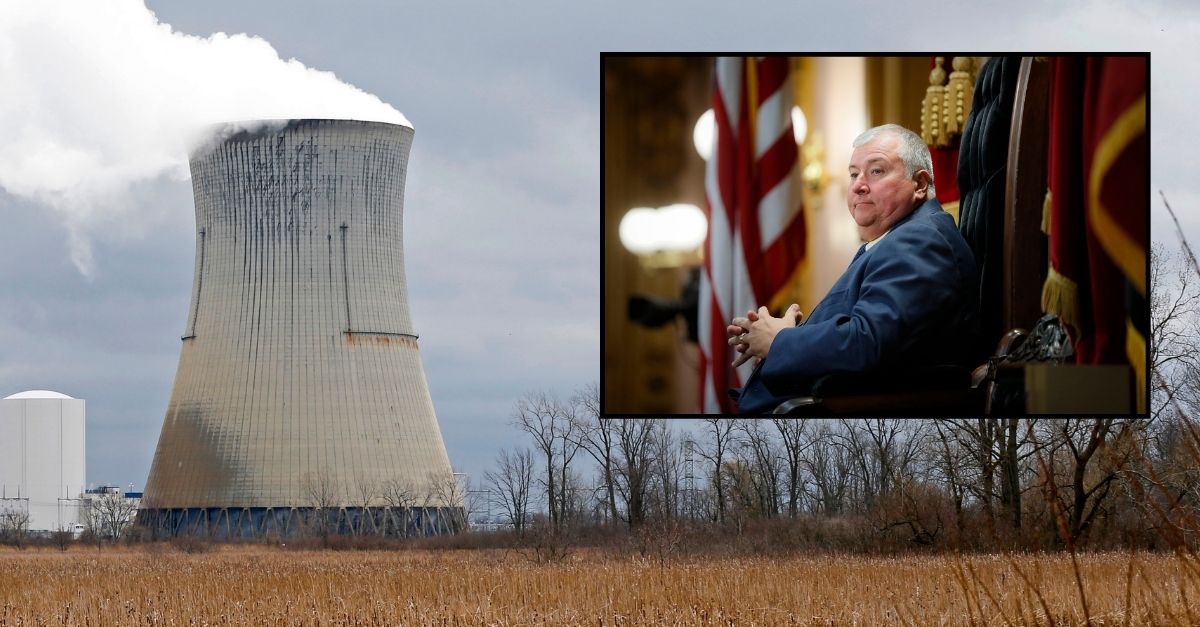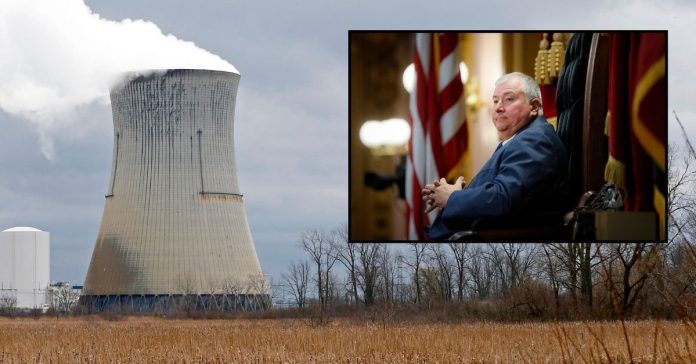
Background: The then-FirstEnergy Corp.’s Davis-Besse Nuclear Power Station in Oak Harbor, Ohio, is pictured on April 4, 2017. (AP Photo/Ron Schwane, File) Inset: Then-Ohio House Speaker Larry Householder sits at the head of a legislative session in Columbus, Ohio, Oct. 30, 2019. Householder took a $61 million bribe in exchange for legislation to give FirstEnergy a $1 billion bailout. (AP Photo/John Minchillo, File)
Sentenced to serve 20 years for accepting a $61 million bribe, disgraced and imprisoned former Ohio Speaker of the House Larry Householder has filed an appeal arguing his First Amendment right to accept undisclosed campaign cash — a la Citizens United v. FEC — is protected, not corrupt.
He has appealed both his verdict and sentence.
The argument is spread out over a massive 105-page brief filed in the U.S. Court of Appeals for the Sixth Circuit and it slams his 2023 jury conviction in which he was found to have played a central role, along with co-defendant Matt Borges, then the Ohio Republican House leader, in orchestrating the state’s largest-ever corruption scandal, according to the Justice Department.
At its core, Householder’s contends that because corporations are legally considered people after the Citizens United ruling — and people have the right to free speech — then those corporations can use their dollars to speak to politicians.
For the imprisoned former politician, the “bribes” he was accused of taking were just that: corporate interests talking to him.
“The Supreme Court has long held that the government ‘may not target … the political access’ that financial support for candidates ‘may afford,’” the brief argues. “’Ingratiation and access are not corruption,’ but rather ‘embody a central feature of democracy—that constituents support candidates who share their beliefs and interests, and candidates who are elected can be expected to be responsive to those concerns.’”
It took jurors six weeks to hear evidence and then a little under ten hours to deliberate before they handed down a verdict finding Householder and Borges guilty of a racketeering conspiracy involving FirstEnergy Corporation. The Akron-based subsidiary-owned company, according to the Associated Press, admitted to its role using so-called “dark money” groups to commit honest services wire fraud in 2021 to pay off public officials for their support of a $1 billion legislative bailout. The corporation also had to pay a fine of $230 million and agree to help investigators probing state corruption.
The bailout enclosed in Ohio’s House Bill 6 would have led to state taxpayers footing FirstEnergy’s costs to shore up a pair of decrepit nuclear plants in the state. An in-depth explainer by the AP on the nuances of the sprawling scandal is available here. At the time of his conviction, Householder told Ohio CBS affiliate WBNS he had “always been committed to the people of Ohio” and that he would use “every step we can in the judicial system to get it right.”
But state prosecutors said then the scheme he orchestrated and Borges participated in was never about helping the people of Ohio, it was about helping themselves to obscene profit and it was about passing legislation for a corporate bailout and then defending the bailout from legitimate attempts to block it.
U.S. Attorney Kenneth Parker, who oversaw the former Republican speaker’s indictment, told the Columbus Dispatch when Householder was convicted: “This is a victory for Ohioans. You cannot sell the public trust. It is not for sale. and you cannot conspire with others to sell the public trust.”
But Householder now says he was a “scapegoat” in the state’s case and that the government “overstepped” its authority to bring the racketeering charges against him and unfairly target him.
“The federal government was not content to charge the then-Speaker of the Ohio House of Representatives, Appellant Larry Householder, with ordinary honest-services bribery charges. Instead, it charged him with leading a racketeering enterprise and tried him as a scapegoat for what it viewed to be a corrupt piece of legislation supported by undisclosed campaign contributions that were permitted by federal law,” the appeal states.
Householder urged the court to reverse its decision and remand for a new trial before a different federal district court judge.
At trial, prosecutors brought out hundreds of texts and emails and financial records, arguing it was proof of Householder efforts to manipulate the legislature and jurors heard from major players in the scheme including a FirstEnergy lobbyist as well as Householder’s own political adviser. Those witnesses, Juan Cespedes and Jeff Longstreth respectively, took plea deals before testifying against Householder, the Dispatch reported. Another lobbyist who was charged in the conspiracy, Neil Clark, died by suicide shortly after his arrest.
Today Householder says “unlike most other bribery prosecutions,” he did not even receive envelopes of cash or extravagant gifts or trips.
“Rather, the government presented evidence that Householder helped raise money into a 501(c)(4) organization, Generation Now. Under federal law, and under the First Amendment, corporations can contribute unlimited monies to those organizations, which are not required to disclose publicly the identity of the contributors,” the appeal states.
When the state prosecuted him, Householder argues the government revealed only that it wanted to “deter corporations and other donors” from exercising their constitutional rights. The evidence showing millions of dollars flowing to him when he backed House Bill 6 wasn’t bribery but effectively, business as usual.
Since the passage of Citizens United v. FEC, lines have been blurry around the ethics of undisclosed corporate cash in politics and its influence.
Householder contends that the district court definition of bribery when it instructed jurors wasn’t accurate. Prosecutors insisted the jury find he committed bribery if he “received the money knowing that the expectation was legislation in return.”
“But an expectation is not, by definition, an agreement. What is required is an objective, agreed-upon exchange. Whether one calls it a promise, an agreement or an understanding, there must be an express or implicit this for that. That is the essence of bribery — not a generalized expectation,” he argues.
Beyond matters of free speech, the former politician contends that his maximum 20 year prison sentence is unfair since other officials involved in public corruption cases have received lesser sentences,. The district court should recalculate the way his sentence was determined because, his attorneys claim, the judge added too many offense levels based on the value of the bribe.
Householder has alleged bias by the presiding judge at his trial, U.S. District Judge Timothy Black, a nominee of former President Barack Obama.
“If the probably of actual bias on the part of the judge is too high to be constitutionally tolerable, the judge must recuse. Here, the district judge ran for the Ohio Supreme Court, was opposed by Householder, who helped raised money into political advocacy groups that did not have to disclose their donors, and those groups too opposed Judge Black’s election to Ohio’s court. Because there was an appearance of impropriety, Judge Black should have recused.”
Black ran for the Ohio Supreme Court in 2000 and judicial recusal is rare.
Prosecutors are expected to oppose the appeal: when they proposed the maximum sentence, they had harsh words for him.
Householder, they have said, was the “quintessential mob boss, directing the criminal enterprise from the shadows and using his casket carriers to execute the scheme.”
Have a tip we should know? [email protected]

